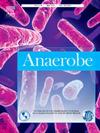A metabolite dehydrogenase pathway represses sporulation of Clostridioides difficile
IF 2.6
3区 生物学
Q3 MICROBIOLOGY
引用次数: 0
Abstract
Objectives
Clostridioides difficile is a major gastrointestinal pathogen that is transmitted as a dormant spore. As an intestinal pathogen, C. difficile must contend with variable environmental conditions, including fluctuations in pH and nutrient availability. Nutrition and pH both influence growth and spore formation, but how pH and nutrition jointly influence sporulation are not known. In this study, we investigated the dual impact of pH and pH-dependent metabolism on C. difficile sporulation.
Methods
We examined the impacts of pH and the metabolite acetoin on C. difficile growth, gene expression, and sporulation.
Results
We found that expression of the predicted acetoin dehydrogenase operon, CD0035-CD0039, was pH-dependent and repressed by acetoin and pyruvate. Regulation of the C. difficile CD0035-CD0039 locus is distinct from characterized orthologous systems and appears to involve a co-transcribed DeoR-family regulator, rather than a sigma54-dependent activator. In addition, an CD0036 null mutant produced significantly more spores and initiated sporulation earlier than the parent strain. However, unlike other Firmicutes, growth and culture density of C. difficile was not increased by acetoin availability or disruption of the dehydrogenase pathway.
Conclusions
Together, these results indicate that acetoin, pH, and the CD0036-CD0039 dehydrogenase pathway play important roles in nutritional repression of sporulation in C. difficile. However, the data do not support the involvement of the CD0036-CD0039 pathway in acetoin metabolism and acetoin is not a significant stationary phase energy source for C. difficile.
一种代谢物脱氢酶途径抑制艰难梭菌的产孢。
艰难梭菌是一种主要的胃肠道病原体,通过休眠孢子传播。作为一种肠道病原体,艰难梭菌必须适应多变的环境条件,包括pH值和养分有效性的波动。营养和pH都影响生长和孢子形成,但pH和营养如何共同影响孢子形成尚不清楚。目的:在本研究中,我们研究了pH和pH依赖性代谢对艰难梭菌产孢的双重影响。方法:我们检测了pH和代谢物乙酰胆碱对艰难梭菌生长、基因表达和产孢的影响。结果:我们发现预测的乙酰丙酮脱氢酶操纵子CD0035-CD0039的表达是ph依赖性的,并被乙酰丙酮酸和丙酮酸抑制。艰难梭菌CD0035-CD0039位点的调控不同于特征的同源系统,似乎涉及共转录的deor家族调控因子,而不是依赖sigma54的激活因子。此外,CD0036零突变体比亲本菌株产生更多孢子和更早开始孢子形成。然而,与其他厚壁菌门不同的是,艰难梭菌的生长和培养密度不会因乙酰托因的可用性或脱氢酶途径的破坏而增加。结论:综上所述,acetoin、pH和CD0036-CD0039脱氢酶途径在艰难梭菌芽孢的营养抑制中起重要作用。然而,这些数据并不支持CD0036-CD0039途径参与乙酰托因代谢,并且乙酰托因不是艰难梭菌的重要固定相能量来源。
本文章由计算机程序翻译,如有差异,请以英文原文为准。
求助全文
约1分钟内获得全文
求助全文
来源期刊

Anaerobe
生物-微生物学
CiteScore
5.20
自引率
8.70%
发文量
137
审稿时长
76 days
期刊介绍:
Anaerobe is essential reading for those who wish to remain at the forefront of discoveries relating to life processes of strictly anaerobes. The journal is multi-disciplinary, and provides a unique forum for those investigating anaerobic organisms that cause infections in humans and animals, as well as anaerobes that play roles in microbiomes or environmental processes.
Anaerobe publishes reviews, mini reviews, original research articles, notes and case reports. Relevant topics fall into the broad categories of anaerobes in human and animal diseases, anaerobes in the microbiome, anaerobes in the environment, diagnosis of anaerobes in clinical microbiology laboratories, molecular biology, genetics, pathogenesis, toxins and antibiotic susceptibility of anaerobic bacteria.
 求助内容:
求助内容: 应助结果提醒方式:
应助结果提醒方式:


